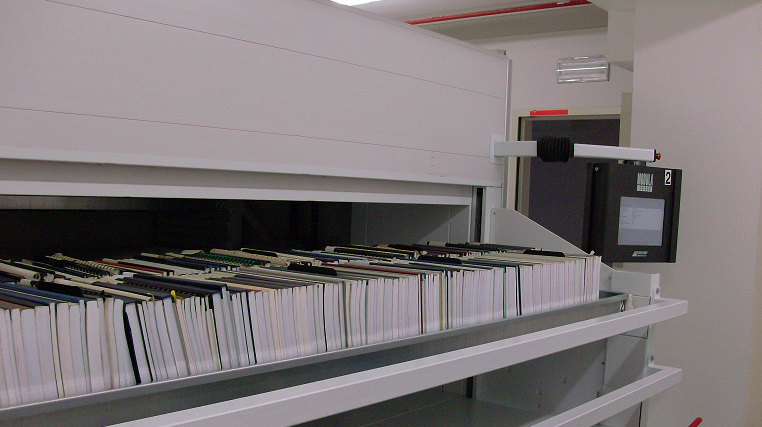The vertical lift storage can be an excellent solution even in applications that do not belong to industry. Modula has provided its high-end storage solutions to the University of Modena. They can now organize their library heritage according to the latest state-of-the-art technology.
The world of intralogistics and industrial automation is not unique to the manufacturing sector. There are cutting-edge solutions for automated vertical storage that are chosen for environments such as universities to make the management of libraries even faster and more efficient, with their archive of texts that each university must handle with care. The main advantage that comes from using automated vertical storage systems is that you can free up valuable space to house the new acquisitions and/or store in a more suitable place material stored in places unsuitable for warehouse use or services.
The Engineering library of the University of Modena and Reggio Emilia, named after Enzo Ferrari, prestigious department attended by students from all over the world, has been using for several years Modula’s vertical automated warehouse with drawers to manage the great collection of books.
The building that houses the library is spread over three floors. Four flights of stairs separate the first from the second level, where you find the reception desk, the main reading room, and where the services are offered. These spaces have expanded the previous library, where the archive material, the current material, the office activity, and the reading room resided in a single environment, revisited several times trying to better define the areas.
Given the new structural conditions, being able to have distinct environments, one of the solutions would have been to place the deposit and the archive on the ground floor (inaccessible to users), distribute the bibliographic resources into two sections, attribute to one half of it the qualification of ‘non-essential’, because of less frequent use or dated, and stow it in the underground, retrieving it when necessary. However, putting out of reach the material used less frequently, yet not exactly sporadically, would have penalized a bibliographic heritage that has been developed over the years through precise choices and that gives a defined connotation to the Engineering library of the University of Modena and Reggio Emilia.
The solution described above would have brought a series of inconveniences to both the operators and the users of the library. The first objective difficulty is the fact that many services are carried out during the opening hours, causing a number of disadvantages that would have penalized the entire management of the library.
This difficulty could have been solved by setting up a booking procedure with delayed delivery, but not without rolling back by nearly three decades the modern service that students expect from a modern facility such as the Department of Engineering.
The second difficulty would have been the time required for the operation, which varies from 5 to 10 minutes, a waiting time that is too long for library users, especially during periods of high concentration.
Finally, from the point of view of the operators, having to go to the deposit is a task that includes a series of downsides, since the elements are crammed, the environment is full of dust, and they are unfamiliar with the arrangement of the pieces.
The library Enzo Ferrari analysed all these aspects in order to find the best solution for the management of the bibliographic material, and that is why it decided to adopt a Modula F250BE, three stories high, equipped with 36 drawers, managed by a PC: ‘With this cutting-edge tool, which I have never encountered in any other library in my professional life, we have organised the material used less frequently, distinguishing it from the actual historical deposit. Modula F250BE is three stories high, in our configuration it has 36 drawers that hold up to 250 kg each. We recently added 7 more drawers, for a total development of 215 ml. (double row),’ says Cinthia Pless, Technical Director of the Library of Engineering ‘Enzo Ferrari’ of the University of Modena and Reggio Emilia.
‘The most interesting and innovative aspect is the possibility to recall each item by a distinctive element (No. inventory, title, position, …) regardless of the disposition by type (books / magazines / CDs / … ) and of the classification by subject (e.g. Hydraulics, Thermodynamics, Automatic controls, Structures, etc.), and finally you can merge the types books, booklets, CD-ROM by format, gaining additional space. Compared to the compactable archives that run on rails, handling is much easier with Modula, because the picking is supported by the monitor, rather than from the operator’s muscular force that from time to time has to open a corridor between the compartments, while the travel time is zeroed; the entire operation requires little more than a minute, without abandoning the service position’ concludes Cinthia Pless.

From the words of Dr. Pless, technical director of the library of the Department of Engineering ‘Enzo Ferrari’ of Modena, one can easily deduce that there have been numerous benefits for the management of the library from the use of Modula’s automated vertical storage system. In particular, the benefits that have resulted from this application have been:
- a strong increase in efficiency of the service offered to the users,
- a much lighter and more agile operability for the library staff,
- an appreciation of the bibliographic heritage of the University of Modena and Reggio Emilia,
- space saved in favor of the reading places offered to library users.
The technology and innovation put in place by Modula with its vertical storage systems with drawers finds wide use not only in the industrial and manufacturing sector, but also in the academic world where speed, accuracy, flexibility, and accessibility are determining factors for an efficient service. The basis for this success is the research and know-how of Modula, a leading company in the world of intralogistics.